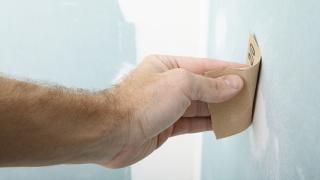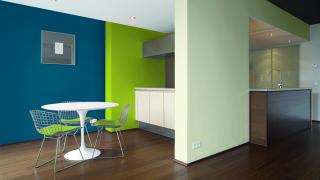Good to see you
Welcome to nordsjo-professional
Terms and Conditions
Thanks! for registering
Successfully registered, please login
Registration complete
Forgotten your password?
Please enter email address associated to your account
Change Password
Password changed successfully.
Request sent!
Would you spare a minute to answer 3 questions
Registration complete
Successfully registered, please login
Delete Account
Flood damage

Repainting after a flood damage
Identification
The first step would be to establish if the areas can be repainted? This can be determined if there is no permanent damage to the substrate such as, Brick, Block, Plaster and Wood.
To get the best results make sure surfaces are sound, clean and dry. Even in favourable conditions drying out can take a long time. This may take up to 2 - 3 months depending on weather conditions. There may be cases where timber and plaster-based surfaces will need to be completely removed and replaced. It would be a recommendation to instruct a building surveyor to inspect your property and provide you with the best course of action.
No Paint coatings should be applied to surfaces that are structurally or superficially damp. All surfaces must be free from condensation, dirt and contamination before painting.
If walls are not allowed to thoroughly dry out before painting, early failure from blistering, flaking, alkali attack and efflorescence may result.
Make sure all surfaces are dry
Internal ventilation and heat will speed up the drying process. Dehumidifiers can be used in very bad conditions. Ventilation is particularly important and without it, heating may aggravate the problem causing condensation on cold surfaces. Solid fuel appliances or other heaters vented to the outside normally provide good ventilation but with electric and central heating, windows have to be kept open. Portable oil or gas heaters produce additional moisture and unless provided with a means of exhausting combustible fumes outside the building they should not be used for drying out. When artificial heating is used to assist drying out, excessive heat should be avoided as it may cause undue shrinkage of wood and cracking.
Please note it is important that you have good air flow movement to take away moisture and prevent mould growth. Were walls are heavily contaminated with organic growth such as lichens mould and algae, these growths must be killed and the surface sterilised before painting. Fungicidal Wash may be used for this purpose. Where growths are particularly heavy a second treatment may be required. After treatment wash the surface with clean water to remove all residues.
Preparation
Remove any defective coating and or wall coverings, efflorescence (white salts on the surface that appear as the fabric of the building dries out) and under bound slurry by rubbing with coarse sacking or stiff nylon brush. Carefully scrape back to a firm edge any/all areas of poorly adhering or defective coating. Make good any cracks holes or imperfections with Nordsjö Professional Light & Smooth Super Filler or Rapid Repair Filler. When dry rub down and dust off. Please ensure to wear a suitable dust mask when sanding down.
Sealing Water Staining
No paint coatings should be applied to surfaces that are structurally or superficially damp. All surfaces must be free from condensation, dirt etc. before and during treatment. Water stains can be sealed with a suitable primer.
Additional Notes
The effects of flood damage sometimes leave odours and smells. This is due to decaying materials which have not been thoroughly cleaned and may need to be replaced. We can also recommend providing additional airflow movement and cleaning down the areas more thoroughly. The environmental agency does recommend cleaning with a commercial grade disinfectant to eliminate and prevent odours. They also recommend using commercial air fresheners.
Moisture levels for painting
Timber moisture content
Exterior 15-18%
Interior 10-12%
Concrete Floors
Below 5%
Masonry walls plaster/ Brickwork
Interiors Below 6%
Exteriors Below 6%
Add a new job
Add a new job
Edit job
Delete job
Are you sure? All notes, photos and saved items will be deleted.
Add to job
Save to My Workspace



